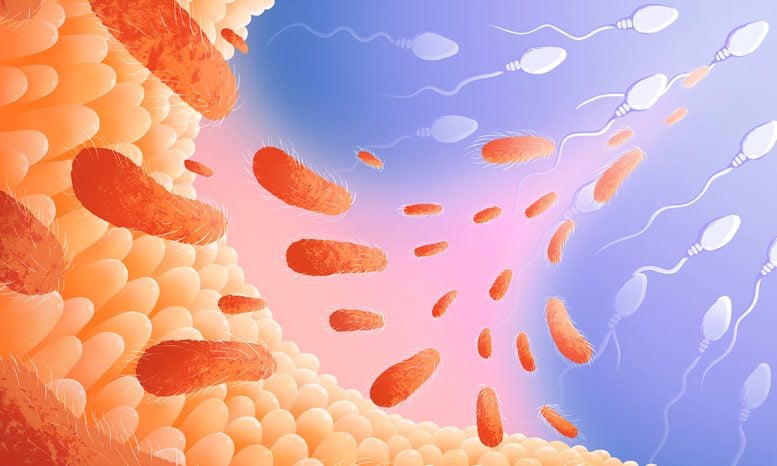
Research conducted by the Hackett group at the European Molecular Biology Laboratory (EMBL) in Rome indicates that altering the gut microbiome of male mice elevates the likelihood of disease in their subsequent generations.
Research led by the Hackett group at EMBL revealed that disrupting the gut microbiota in male mice affects their offspring, resulting in lower birth weights and higher mortality rates. This intergenerational impact is mediated through a newly identified ‘gut-germline axis,’ affecting hormonal signaling and testicular physiology, but these effects are reversible once normal microbiota is restored.
The gut microbiota is a community of microorganisms residing in the gastrointestinal tract. It plays a key role in producing enzymes, metabolites, and other molecules essential for host metabolism and environmental responses.
Consequently, a balanced gut microbiota is important for mammalian health in many ways, such as helping to regulate the immune and endocrine systems. This, in turn, impacts the physiology of tissues throughout the body. However, little was known about the impact of the gut microbiota on host reproduction, and whether an altered microbiota in a father could influence the fitness of his offspring.
The Hackett group at EMBL Rome, in collaboration with the Bork and the Zimmermann groups at EMBL Heidelberg, set out to answer this question, with their results now published in the journal Nature. The scientists showed that disrupting the gut microbiota in male mice increases the probability that their offspring are born with low weight, and are more likely to die prematurely.
What is passed on to the next generation
To study the effects of the gut microbiota on male reproduction and their offspring, the researchers altered the composition of gut microbes in male mice by treating them with common antibiotics that do not enter the bloodstream. This induces a condition called dysbiosis, whereby the microbial ecosystem in the gut becomes unbalanced.
The scientists then analyzed changes in the composition of important testicular metabolites. They found that in male mice dysbiosis affects the physiology of the testes, as well as metabolite composition and hormonal signalling. At least part of this effect was mediated by changes in the levels of the key hormone leptin in the blood and testes of males with induced dysbiosis. These observations suggest that in mammals, a ‘gut-germline axis’ exists as an important connection between the gut, its microbiota, and the germline.
An animation detailing the findings. Credit: European Molecular Biology Laboratory
To understand the relevance of this ‘gut-germline’ axis to traits inherited by offspring, the scientists mated either untreated or dysbiotic males with untreated females. Mouse pups sired by dysbiotic fathers showed significantly lower birth weights and an increased rate of postnatal mortality. Different combinations of antibiotics as well as treatments with dysbiosis-inducing-laxatives (which also disrupt microbiota) affected offspring similarly.
Importantly, this effect is reversible. Once antibiotics are withdrawn, paternal microbiota recover. When mice with recovered microbiota were mated with untreated females, their offspring were born with normal birthweight and developed normally as well.
“We have observed that intergenerational effects disappear once a normal microbiota is restored. That means that any alteration to the gut microbiota able to cause intergenerational effects could be prevented in prospective fathers” said Peer Bork, EMBL Heidelberg Director, who participated in the study. “The next step will be to understand in detail how different environmental factors such as medicinal drugs including antibiotics can affect the paternal germline and, therefore, embryonic development.” Ayele Denboba, first author of the publication and former postdoc in the Hackett Group, now Group Leader at the Max Planck Institute of Immunology and Epigenetics in Freiburg, Germany added: “The study originated to understand environmental impacts on fathers by considering the gut microbiota as a nexus of host-environment interactions, thus creating a sufficient-cause model to assess intergenerational health risks in complex ecological systems.”
Paternal impact on pregnancy disease risk
In their work, Hackett and his colleagues also discovered that placental defects, including poor vascularisation and reduced growth, occurred more frequently in pregnancies involving dysbiotic males. The defective placentas exhibited hallmarks of a common pregnancy complication in humans called pre-eclampsia, which leads to impaired offspring growth and is a risk factor for developing a wide range of common diseases later in life.
“Our study demonstrates the existence of a channel of communication between the gut microbiota and the reproductive system in mammals. What’s more, environmental factors that disrupt these signals in prospective fathers increase the risk of adverse health in offspring, through altering placental development” said Jamie Hackett, coordinator of the research project and an EMBL Rome Group Leader. “This implies that in mice, the environment of a father just prior to conception can influence offspring traits independently of genetic inheritance.”
“At the same time, we find the effect is for one generation only, and I should be clear that further studies are needed to investigate how pervasive these effects are and whether they have relevance in humans. There are intrinsic differences to be considered when translating results from mouse models to humans.” Hackett continued: “But given the widespread prevalence of dietary and antibiotic practices in Western culture that are known to disrupt the gut microbiota, it is important to consider paternal intergenerational effects more carefully – and how they may be affecting pregnancy outcomes and population disease risk.”
Reference: “Paternal microbiome perturbations impact offspring fitness” by Ayele Argaw-Denboba, Thomas S. B. Schmidt, Monica Di Giacomo, Bobby Ranjan, Saravanan Devendran, Eleonora Mastrorilli, Catrin T. Lloyd, Danilo Pugliese, Violetta Paribeni, Juliette Dabin, Alessandra Pisaniello, Sergio Espinola, Alvaro Crevenna, Subhanita Ghosh, Neil Humphreys, Olga Boruc, Peter Sarkies, Michael Zimmermann, Peer Bork and Jamie A. Hackett, 1 May 2024, Nature.
DOI: 10.1038/s41586-024-07336-w